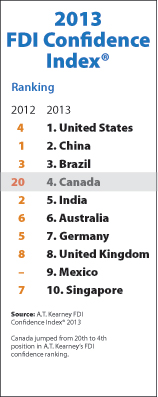Canada has vast resources of oil and gas and is the world’s tenth-largest economy. It is also known for its solid banking system, which is consistently ranked as one of the best in the world by the World Economic Forum. In fact, during the Great Recession, no Canadian bank or insurance company failed or required financial help from the government to stay afloat. According to the U.S. Department of State’s Bureau of Economic and Business Affairs, trade between Canada and the U.S. is largely free of restrictions and has doubled in volume over the past decade. About 53 percent of Canada’s foreign direct investment (FDI) comes from the United States. Free Trade
One reason Canada is such a good place to invest is that it is part of the 1989 Canada-United States Free Trade Agreement (CUFTA) and 1994 North America Free Trade Agreement (NAFTA), which reduce barriers to the trade of goods and services among Canada, the U.S., and Mexico. Companies from around the world are drawn to the North American consumer market, which is one of the largest and most affluent in the world.
Canada’s closest trading partner is the United States. According to the U.S. Department of State’s Bureau of Economic and Business Affairs, trade between Canada and the U.S. is largely free of restrictions and has doubled in volume over the past decade. About 53 percent of Canada’s foreign direct investment (FDI) comes from the United States. U.S. services exports to Canada totaled more than US$56 billion in 2011, while Canada’s services exports to the United States totaled more than US$28 billion. At the end of 2011, Canada’s stock of U.S. FDI was almost US$320 billion.

Canada’s steady — but unspectacular — economic growth in 2013 (recently re-forecast by the International Monetary Fund to be 1.6 percent) — has not deterred foreign investment. For example, Canada recently ranked as the fourth-best country for international investment according to A.T. Kearney’s Foreign Direct Investment Confidence Index®, which surveys hundreds of global business leaders from over 25 countries. The survey ranks countries on how current and near-future political, economic, and regulatory changes will affect international investment flows. Canada recently ranked as the fourth-best country for international investment according to A.T. Kearney’s Foreign Direct Investment Confidence Index®, which surveys hundreds of global business leaders from over 25 countries. More than 100 Canadian projects valued at $1 billion or more have been announced for the 2012–2020 period, many of them in oil and gas, mining, and primary metals. Other recent major investments by foreign companies include Ubisoft (multimedia), Almirall (pharmaceuticals), PFW (aerospace), Ankama (multimedia), Ruukki (steel manufacturing), Savvis (information technology), Fineos (high technology), and FACC — which specializes in the manufacture of composite components for aviation and aerospace.
Canada has also worked out a trade agreement with the European Union, which will enhance the exchange of goods and services between Canada and the EU. The EU is one of the largest services economies in the world, valued at about $12.1 trillion in GDP for 2012. As a result of this free-trade agreement, Canada has announced it will also relax its limits on foreign investment by other countries, including the U.S. and Mexico. By increasing the threshold limits for these nations, Canada will further stimulate foreign direct investment in its key industries.



